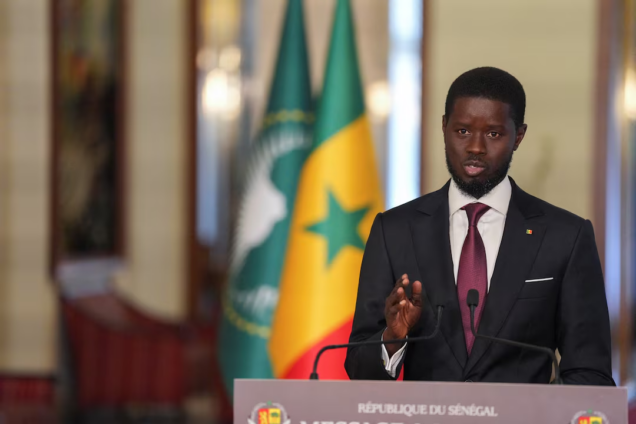Senegal's government unveiled a 25-year development plan on Monday that it said would lay the foundations for economic sovereignty through competitiveness, sustainable resource management and good governance.
The agenda was launched seven months after President Bassirou Diomaye Faye clinched a landslide election victory on a promise to improve livelihoods in the West African nation.
"We aim to build a diversified and resilient economy," Faye said at the launch ceremony, which comes a month ahead of a snap legislative election.
"Our ... economy has been neutralised by a model of exploiting raw materials without any significant local processing or valorisation, leaving our domestic private sector too weak ... and our young talent in desperate search of opportunities," he said.
Senegal became an oil producer in June when Australia's Woodside Energy started production at its Sangomar oil and gas field. Gas production is also due to begin by the end of the year at the Greater Tortue Ahmeyim liquefied natural gas project, operated by BP.
Early in his presidency, Faye initiated an audit of oil and mining contracts, but the authorities have not shared details on its progress.
The first phase of the economic plan, which will cost $30.1 billion and run from 2025-2029, aims to reduce the budget deficit to 3% of GDP throughout that period, down from 4.9%.
It will be funded by a mix of public, private, and public-private partnership financing. It is based on an average growth rate of 6.5% and an increase in the average tax burden to 21.7%.
The International Monetary Fund reduced Senegal's growth forecast to 6.0% in September, down from a forecast of 7.1% in June, after the economy expanded at a slower-than-projected pace in the first half.
Under the new plan, the government aims to increase access to electricity to 100% from 84% and make Senegal energy self-sufficient.
The new administration will also modify Senegal's deficit financing structure in order to reprofile national debt.
Faye has been under pressure to make good on his election promises from the disenfranchised urban youth, whose support helped bring him to power.
The president has also faced resistance from the national assembly, prompting him to dissolve parliament last month, paving the way for the snap legislative election on Nov. 17.
His Pastef party had little leverage with only 26 seats in the now-dissolved 165-member parliament.
Government revenue fell significantly in the first eight months of the year, according to the IMF, and there are concerns the election could delay IMF financing.
Latest Stories
-
T-bills auction: Government got GH¢21.5bn in November 2024, lower than target
2 hours -
Ghana to return to single digit inflation in quarter one 2026
2 hours -
Panama’s president calls Trump’s Chinese canal claim ‘nonsense’
3 hours -
Manmohan Singh, Indian ex-PM and architect of economic reform, dies at 92
3 hours -
Government is not been fair to WAEC – Clement Apaak on delay to release WASSCE results
3 hours -
Bayer Leverkusen’s Jeremie Frimpong donates to Osu Children’s Home in Ghana
6 hours -
GPL 2024/25: Heart of Lions beat Young Apostles to go three points clear
6 hours -
Dance battles, musical chairs light up Joy FM Party in the Park
7 hours -
Kwabena Kwabena, Camidoh, Kwan Pa Band, others rock Joy FM Family Party in the Park
7 hours -
GPL 2024/2025: Aduana beat struggling Legon Cities
7 hours -
GPL 2024/25: Bechem United fail to honor match against Holy Stars
7 hours -
Cooking competition takes centrestage at Joy FM Family Party In The Park
8 hours -
Album review: ‘Wonder’ by Nana Fredua-Agyeman Jnr
10 hours -
Bouncy castle, sack race, and smiles galore: Joy FM Family Party takes over Aburi Gardens
10 hours -
Watch: Kwan Pa Band thrills patrons at Joy FM Family Party in the Park
10 hours

